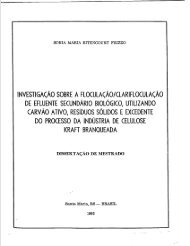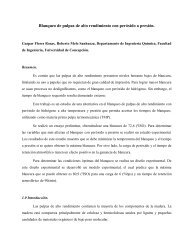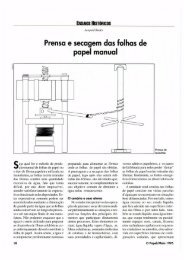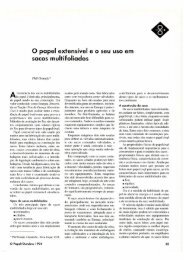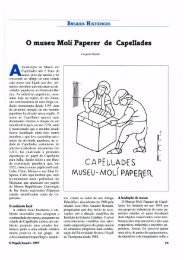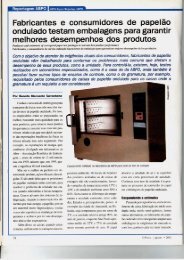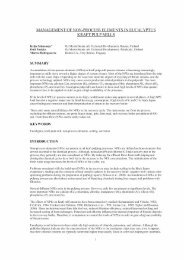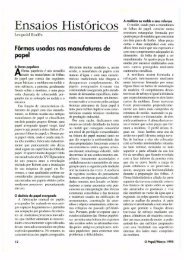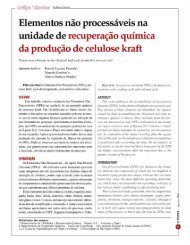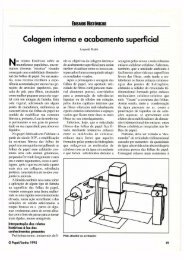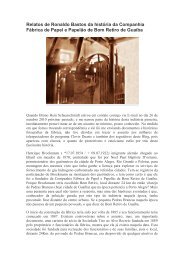O Eucalipto: um século no Brasil (The Eucalypt - Celso Foelkel
O Eucalipto: um século no Brasil (The Eucalypt - Celso Foelkel
O Eucalipto: um século no Brasil (The Eucalypt - Celso Foelkel
You also want an ePaper? Increase the reach of your titles
YUMPU automatically turns print PDFs into web optimized ePapers that Google loves.
O<br />
<strong>Brasil</strong> consome a cada a<strong>no</strong> 300 milhões de metros cúbicos de madeira e, desse total,<br />
apenas 70 milhões provêem de florestas plantadas, as quais somente nas últimas décadas<br />
começaram a se espalhar, predominantemente, sobre terre<strong>no</strong>s degradados, pastos<br />
e antigos cafezais, áreas que há <strong>século</strong>s tinham perdido a cobertura arbórea.<br />
Apesar de todo o esforço feito até agora, apenas 3,5 milhões de hectares estão atualmente<br />
cobertos por florestas de eucaliptos, ou seja, 0,35% do território nacional e esse total precisaria<br />
quadruplicar, para que fosse possível eliminar a pressão sobre as matas nativas.<br />
O dilema que se impõe é a<strong>um</strong>entar drástica e rapidamente a área ocupada pela silvicultura<br />
ou, por mais que legislações restritivas vedem o desmatamento, ele continuará a ser feito,<br />
pois a demanda precisa ser atendida, mesmo com o corte ilegal de árvores.<br />
O País necessita de imensas quantidades de madeira para a indústria da construção, para<br />
produzir papel, para fazer carvão para as siderurgias e para fazer móveis, agora que se esgotaram<br />
os estoques de madeiras de lei principalmente peroba-rosa ‘Aspiodosperma cylindrocarpon’<br />
e imbuia ‘Ocotea porosa’, que nasciam consorciadas com o pinheiro-do-paraná<br />
‘Araucaria angustifolia’ e foram destruídas com ele; também como lenha em milhões de<br />
casas <strong>no</strong> interior, onde o gás ainda não chegou, e para fornecer a imensurável quantidade de<br />
mourões de cerca, que passaram a ser de eucalipto tratado, à medida que foi proibido o corte<br />
da aroeira ‘Schinus ssp’, tão explorada que se temia pela sobrevivência da espécie.<br />
Brazil uses 300 million cubic meters of wood every year, and only in the past<br />
decades, has begun to spread, predominantly on depleted soil, pastures, and<br />
old coffee plantations, areas that for centuries had lost their tree coverage.<br />
Despite the efforts until <strong>no</strong>w, only 3.5 million hectares are currently covered<br />
by eucalypt forests, or, 0.35% of the national territory; and this total would need to<br />
quadruple to allow eliminating the pressure on native forests.<br />
<strong>The</strong> dilemma is to dramatically and quickly increase the area of silviculture or, despite<br />
increasing restrictive legislation forbidding deforesting; it will continue to happen,<br />
because the demand must be fulfilled, even if with illegal harvesting of trees.<br />
<strong>The</strong> country needs immense quantities of wood to meet demand of construction, pulp<br />
and paper, charcoal for metallurgy of iron and steel, for producing furniture, <strong>no</strong>w that<br />
the specialty wood stocks have been depleted (mainly peroba-rosa ‘Aspidosperma cylindrocarpon’<br />
and imbuia ‘Ocotea porosa’), that grew with pinheiro-do-paraná ‘Araucaria<br />
angustifolia’, and that were destructed with it. As wood for millions of houses in the<br />
interior, where gas has <strong>no</strong>t yet arrived, and to supply an immeasurable quantity of<br />
fence posts, which are <strong>no</strong>w made of treated eucalypts, because of the prohibition of the<br />
cutting of aroeira ‘Schinus spp’, which was explored to a point of exhaustion that it is<br />
feared it may become extinct.<br />
O E U C A L I P T O C O M O S O L U Ç Ã O - E U C A L Y P T S A S A S O L U T I O N<br />
13<br />
Queimada <strong>no</strong> <strong>Brasil</strong> Central.<br />
Wood-burning in Central Brazil.




